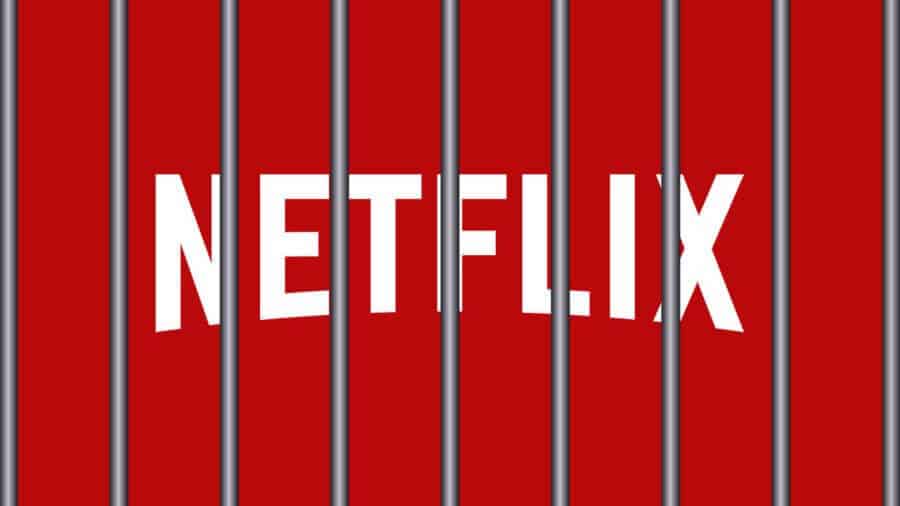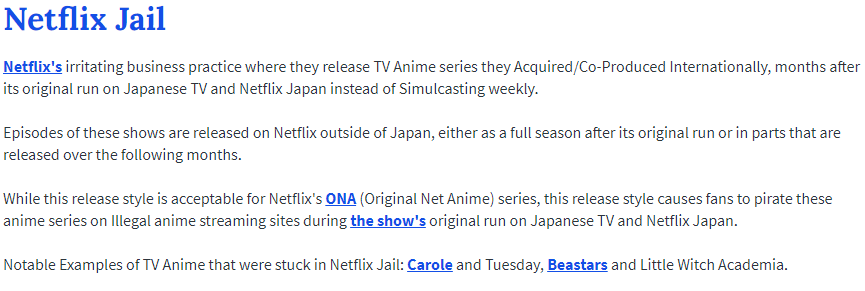
You may have seen many anime fans (or fans of international television in general) use the term “Netflix Jail”. Below, we’ll take you through exactly what Netflix Jail means and why it puts Netflix at a disadvantage and perhaps most importantly, how Netflix could resolve it.
In recent years Netflix has stepped up its effort to acquire more new and exciting anime for its subscribers.
Relatively speaking, the streaming service has been very successful, especially when you consider the popularity of such anime like Beasters and The Seven Deadly Sins. Both of which have been smash-hits. Sadly, there has been an alarming amount of discord growing amongst the anime community and Netflix. In particular, anime fans have become increasingly frustrated with the way Netflix releases its “Original” anime.
Frustration has grown to such an extent, the term Netflix Jail has been used to describe the wait between the Japanese broadcast of an anime and its subsequent global Netflix release.
What is Netflix Jail?

Netflix Jail as defined by Urban Dictionary
As you can see from the snapshot above, the term Netflix Jail has been used to describe the time between the Japanese broadcast and its eventual Netflix release date. Anime fans can be waiting up to several months before the arrival of a hot new anime, case in point, Beastars was broadcast in Japan from October to December 2019, but didn’t arrive on Netflix until March 2020.
The obvious frustration stems from the fact that Netflix hasn’t begun simulcasting its Original anime while the series is being broadcast in Japan. Typically, the counter-argument to that is Netflix has to Dub and Sub the series in over 30 different languages before it can be released globally.
Netflix Jail is the fastest way to kill anime hype lmaooo
— YonkouProductions (@YonkouProd) May 20, 2020
It’s worth noting that this doesn’t just affect anime on Netflix. Even some English titles have to wait for the remaining Dubs and Subs to be produced before being released internationally.
Why Netflix Jail puts the service at a disadvantage over its competitors
Unfortunately for Netflix, competitors are piling on the pressure. In particular, Crunchyroll, who has become the main source of anime for many in the community, has pulled far ahead of Netflix in the simulcast game. This is mainly due to the fact that Crunchyroll has been simulcasting anime, making sure that nine languages are available to audiences, those being:
- Arabic
- English (US)
- French
- German
- Italian
- Portuguese (Brazil)
- Russian
- Spanish (Latin America)
- Spanish (Spain)
To add further fuel to the flame, Netflix has already begun simulcasting Originals and has been doing so for some time, but not for anime. On a near-weekly basis, Netflix has been simulcasting K-Dramas around the world. While Netflix hasn’t been simulcasting in over 30 languages for K-Dramas you can still stream them in English, Spanish, Brazilian Portuguese, and Traditional Chinese subtitles.
Netflix Japan themselves gets most of these anime episodes on a weekly basis so it’s not like Netflix doesn’t have it absent from its library.
English, Spanish, and Brazilian Portuguese cover the vast majority of your anime audience outside of Asia. If Netflix took the steps to begin simulcasting in the languages mentioned previously, it would generate a resounding amount of positivity from the anime community.
In 2020, a world where everything is available at the touch of a button, it’s become an increasingly hard task asking for viewers to wait.
What is the impact of Netflix Jail?
Arguably, one of the largest impacts Netflix Jail has had is the way fans are consuming anime. If fans are expected to wait several months for an anime, that realistically, could have been simulcast, then it shouldn’t come as a surprise when they take to torrent sites, or poorly subbed YouTube edits.
Despite the headway Netflix is trying to make with its Original anime, it’s having a negative effect on the community.
Many fans out of protest choose to avoid Netflix outright and settle for subscribing to competitors such as FUNimation and Crunchyroll. The reputation for Netflix and anime has become so dire, at times, you can almost feel the collective groan on Twitter when a hype new anime is sentenced to Netflix Jail.
Netflix jail for anime remains the single dumbest conscious design decision a streaming platform could make
— Emily (@SpaceQueenEmily) January 13, 2020
How can Netflix resolve this?
Simulcasting. Simulcasting. Simulcasting.
In case you don’t know, here’s how Restream describes simulcasting:
“Simulcast” is a portmanteau of the words “simultaneous” and “broadcast,” and that’s exactly what it means – a simultaneous broadcast if it’s used as a noun, or to broadcast simultaneously if it’s used as a verb.
If Netflix were to begin simulcasting, there would be a radical shift in the relationship between the streaming service and the anime community. Even if simulcasting only began with English and Spanish, this would still make many anime fans happy. Pursuing other languages for simulcasting could be looked at once Netflix believes simulcasting is a success.
To some degree, Netflix has already dipped its toes in the water when they released Baki part 3 on Netflix. Originally, the first season (part 1 and 2) was broadcast in Japan and global subscribers had to wait several months for each part’s respective release date, but Baki part 3 dropped on Netflix around the world at the same time. Despite there being no dubs available, this still had a resoundingly positive impact between Netflix and Baki fans. When part 4 eventually drops, fans can look forward to not having to wait several months before it arrives on Netflix.
Netflix needs to put a stop to burning its bridge with the anime community. If Netflix can prove to fans that its streaming service is best catered for anime fans, then the community will reward that in kind. At the very least, for now, Netflix should begin simulcasting as soon as possible.
What do you think of the current status of anime on Netflix? Let us know in the comments below!




